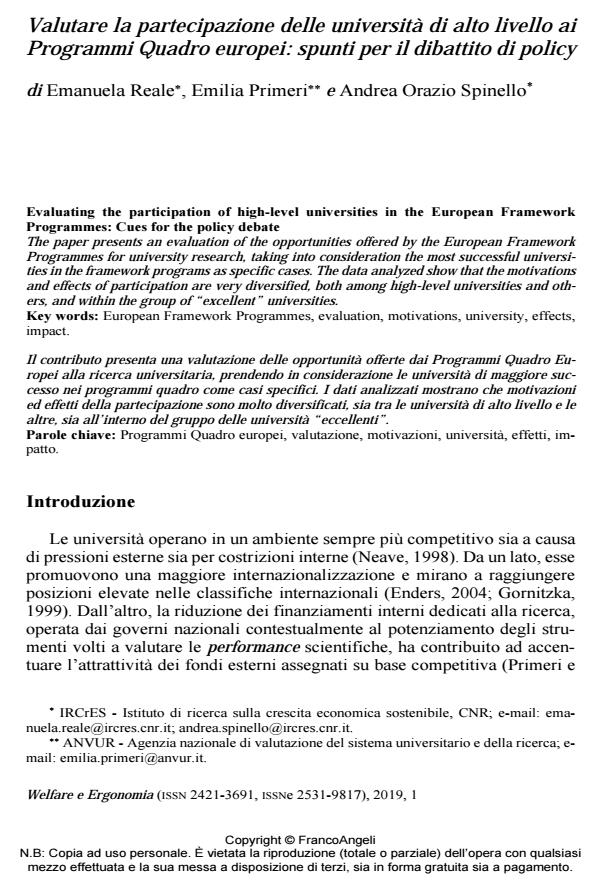Evaluating the participation of high-level universities in the European Framework Programmes: Cues for the policy debate
Journal title WELFARE E ERGONOMIA
Author/s Emanuela Reale, Emilia Primeri, Andrea Orazio Spinello
Publishing Year 2020 Issue 2019/1
Language Italian Pages 12 P. 43-54 File size 189 KB
DOI 10.3280/WE2019-001005
DOI is like a bar code for intellectual property: to have more infomation
click here
Below, you can see the article first page
If you want to buy this article in PDF format, you can do it, following the instructions to buy download credits

FrancoAngeli is member of Publishers International Linking Association, Inc (PILA), a not-for-profit association which run the CrossRef service enabling links to and from online scholarly content.
The paper presents an evaluation of the opportunities offered by the European Framework Programmes for university research, taking into consideration the most successful universi-ties in the framework programs as specific cases. The data analyzed show that the motiva-tions and effects of participation are very diversified, both among high-level universities and others, and within the group of "excellent" universities. .
Keywords: European Framework Programmes, evaluation, motivations, university, effects, impact
- Altbach P.G., Reisberg L. and Rumblwey L.E. (2009). Trends in Global Higher Education: Tracking an Academic Revolution. A Report Prepared for the UNESCO 2009 World Conference on Higher Education. United Nations Educational, Scientific and Cultural Organization.
- Arrow K.J. (1993). Excellence and Equity in Higher Education. Education Economics, 1(1): 5-12. DOI: 10.1080/09645299300000002
- Breschi S. e Cusumano L. (2004). Unveiling the texture of a European Research Area: emergence of oligarchic networks under EU framework programmes. International Journal of Technology Management, 8: 747-772. DOI: 10.1504/IJTM.2004.004992
- Ciffolilli A., Colombelli A., Primeri E., Reale E., Scellato G., Bannò M., Caviggioli F., Condello S., De Marco A.M., Spinello A.O., Ughetto E., Scherngell T., Heller-Schuh B. and Wolleb E. (2016). An analysis of the role and engagement of universities with regard to participation in the Framework Programme, Final Report. Luxembourg: Publications Office of the European Union.
- Enders J. (2004). Higher education, internationalization and the nation-state: recent developments and challenges to governance theory. Higher Education, 47: 365-370. DOI: 10.1023/B:HIGH.0000016461.98676.30
- Geuna A. (1998). Determinants of university participation in EU-funded R&D cooperative projects. Research Policy, 26: 677-687. DOI: 10.1016/S0048-7333(97)00050-4
- Geuna A. (2001). The changing rationale for European University research funding: are there negative unintended consequences. Journal of Economic Issues, 35: 607-632. DOI: 10.1080/00213624.2001.11506393
- Gornitzka A. (1999). Governmental policies and organisational changes in higher education. Higher Education, 38: 5-31. DOI: 10.1023/A:100370321
- Guri S. (1986). Equality and excellence in higher education – Is it possible? Higher Education, 15(1): 59-71. DOI: 10.1007/BF00138092
- Henriques L., Schoen A. and Pontikakis D. (2009). Europe’s top research universities in FP6: scope and drivers of participation. Luxembourg: Office for Official Publications of the European Communities.
- Lascoumes P. et Le Galès P. (2005). Gouverner par les instruments. Paris: Les Presses de Sciences Po.
- Lepori B. and Reale E. (2012). S&T indicators as a tool for formative evaluation of research programs. Evaluation, 18(4): 451-465. DOI: 10.1177/1356389012460961
- Lepori B., Veglio V., Heller-Schuh B., Schnergell T. and Barber M. (2015). Participation to European Framework Programs of higher education institutions and their association with organizational characteristics. Scientometrics, 105(3): 2149-2178. DOI: 10.1007/s11192-015-1768-2
- Luukkonen and Nedeva (2010). Towards understanding integration in research and research policy. Research Policy, 39(5): 674-686.
- Molas-Gallart J. and Davies A (2006). Toward theory-led evaluation – the experience of European science, technology and innovation policies. American journal of evaluation, 27: 64-82. DOI: 10.1177/1098214005281701
- Neave G. (1998). The Evaluative State Reconsidered. European Journal of Education, 33(3): 265-284.
- Nokkala T., Heller-Schuh B. and Paier, M. (2011). Ranking Lists and European Framework Programmes: Does University Status Matter for Performance in Framework Programmes? In: Teixeira P. and Dill D., editors, Public Vices, Private Virtues? Assessing the Effects of Marketization in Higher Education. Rotterdam: Sense Publishers.
- Olechnicka A., Ploszaj A. and Dorota Celińska-Janowicz (2019). The Geography of Scientific Collaboration. London and New York: Routledge.
- Primeri E. (2008). L’internazionalizzazione della ricerca nelle istituzioni scientifiche pubbliche. In: Reale E., a cura di, La valutazione della ricerca pubblica. Un’analisi della Valutazione Triennale della Ricerca. Milano: FrancoAngeli.
- Primeri E. and Reale E. (2012). How Europe Impacts on Academic Research: The Transformative Potential of the European Framework Programmes. In: Vukasović M., Maassen P., Nerland M., Stensaker B. and Stensaker B., editors, Effects of Higher Education Reforms: Change Dynamics. Rotterdam: Sense Publishers.
- Reale E., Nedeva M., Thomas D. and Primeri E. (2014). Evaluation through impact: a different viewpoint. Fteval Journal for Research and Technology Policy Evaluation, 39: 36-41
Emanuela Reale, Emilia Primeri, Andrea Orazio Spinello, Valutare la partecipazione delle università di alto livello ai Programmi Quadro europei: spunti per il dibattito di policy in "WELFARE E ERGONOMIA" 1/2019, pp 43-54, DOI: 10.3280/WE2019-001005